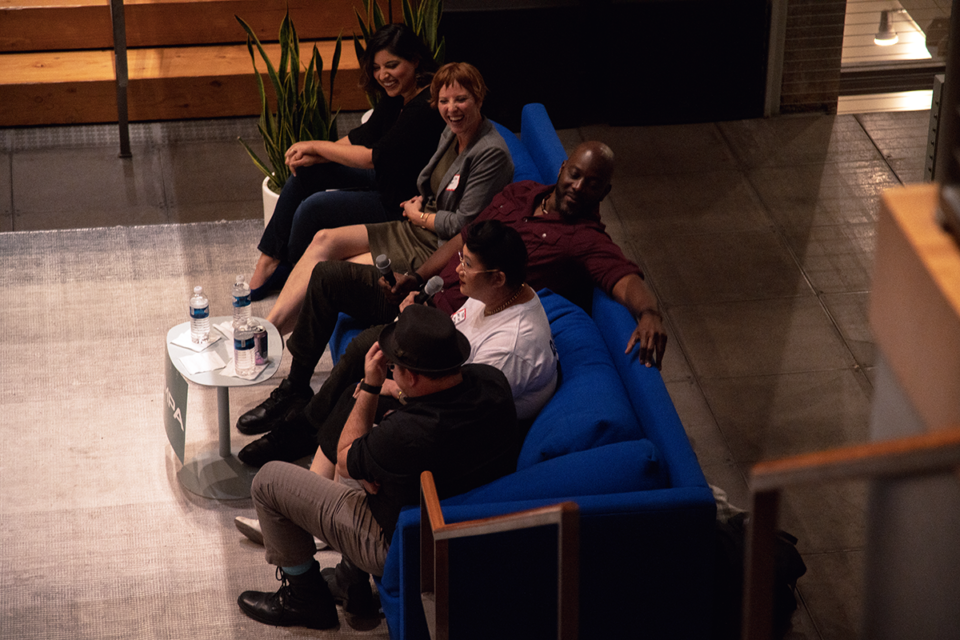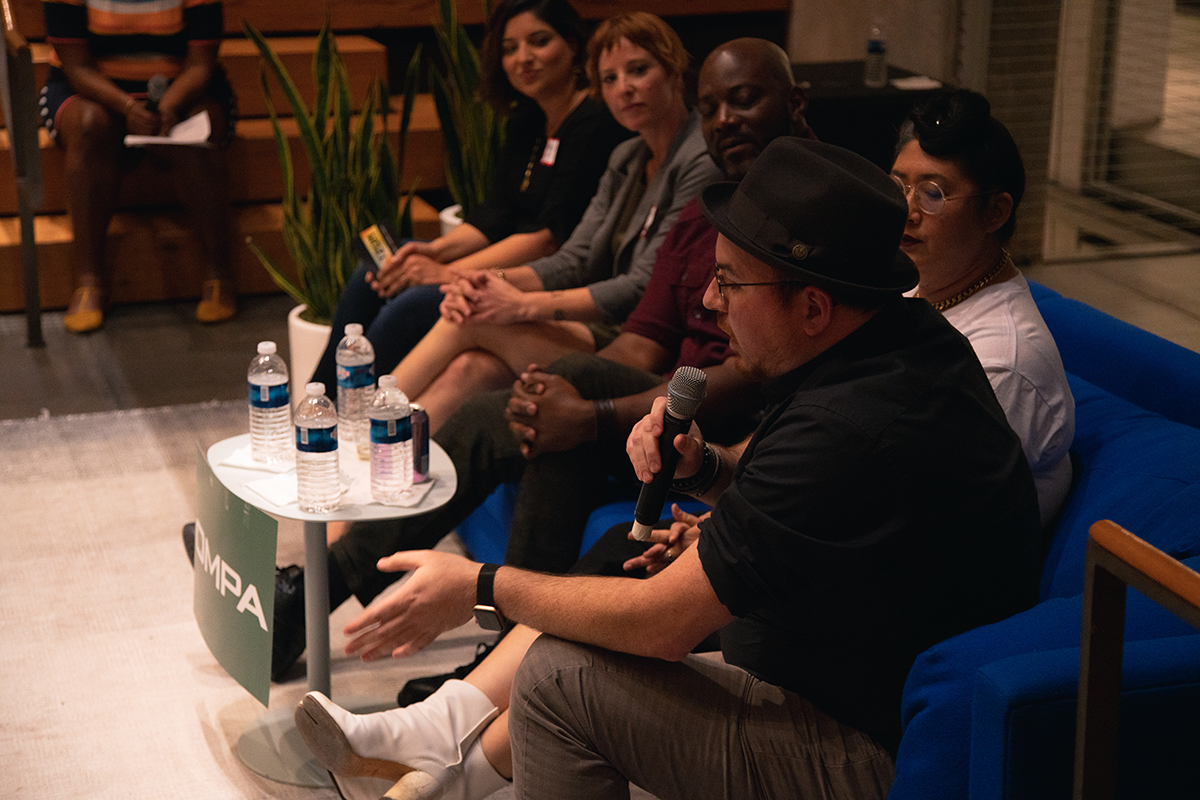
OMPA elevates local creatives for conversation on unique challenges
Reporting by Annika James | Write-up by Lilly Joynes | Photography by Pedro Valdez Jr.
Portland is known as one of the whitest cities in America. Fortunately, our community of creatives are also vocal and ambitious in their desire to create positive change. That includes leading the way in diversifying the traditionally white, male-dominated entertainment industry.
OMPA is proud to create opportunities for these conversations, networking opportunities, and paid production placements through our events and other initiatives. Recently, we welcomed roughly 200 community members to join us at Wieden+Kennedy for a conversation with several seasoned pros from underrepresented groups. Our goal was to open a dialogue, create a deeper understanding of the challenges each faces, and provide real actions people can take to help reshape what the industry looks like.

Roughly 200 attendees turned out to hear from our panel of diverse creative professionals. (Photo by Pedro Valdez Jr.)
The evening’s conversation participants were:
- Jerry Bell Jr., Director, Producer, & Actor, JBJR Productions
- Fran Bittakis, Founder & Creative Director, JOOP JOOP Creative
- Adolfo Cantú-Villarreal, Freelance Cinematographer, AdolfoCV
- Maribel De Leon, Founder & Producer, TZOM Films
- Eva Moss, Director, Editor, & Producer; President, Couch Film Collective
Tiffany Golden—Producer, Integrated, Community Programs at Wieden+Kennedy moderated.
IMPROVING HIRING PRACTICES
The overall message was that we need to be more proactive and thoughtful when hiring, and throughout the entire production process. As Adolfo expressed, you shouldn’t be hiring just your friends and go-to people. Or, as Fran elaborated, people who look like you. She emphasized the importance of having shared values with the people you hire and work with.
Hiring diverse crews isn’t about checking a box, though. It’s about adding some “seasoning” to sets, as Adolfo compared it. A meal with just salt is pretty bland, but becomes better when you add a variety of other spices. In other words, diverse teams bring a wider scope of perspectives to the writing room and set culture.
Eva took it one step further: “The best way to avoid making someone feel like a token, is to hire more than one.” Tiffany and Jerry also echoed that the diverse people you hire shouldn’t be seat-fillers. Their contributions must be equally valued.

Couch Film Collective President Eva Moss says "the best way to avoid having someone feel like a token, is to hire more than one." (Photo by Pedro Valdez Jr.)
ACKNOWLEDGING CULTURE
Language was an interesting topic of the evening. As a black actor from Atlanta, Jerry is surprised when PNW scriptwriters tell him what he should sound like. Adolfo also shared a cringe-worthy story of being a DP on a commercial set with a Spanish script. As most of the crew nodded approvingly, he pointed out that the actor was actually speaking nonsense and not Spanish at all. He was the only person on set fluent in Spanish.
A couple of the panelists mentioned being underestimated due to the way they look or sound. Maribel grew up in Dallas, TX where, " A large percentage of her community were recent immigrants or first-generation Americans." She shared that when she went to her bank for a business service for her company, she was treated as if she was getting in over her head despite having a degree in Business Management. She recognizes that the judgment was most likely made based on her being a woman and being Latina.

Tiffany agreed that even seasoned creatives from underrepresented groups often experience the same hurdles as entry-level professionals. She discussed the need to humanize experiences such as work, family, and dignity from varying perspectives. Jerry echoed that in saying "We need people from all aspects of life on a project."
Despite a common theme of difficulty gathering funding for their projects or even just being paid for their work, Fran offered a different way to look at it. “If this is the level of work we produce with little to no budget, imagine what we could do with a lot of funding!” Still, Jerry Bell admitted it’s discouraging to put so much effort into funding to only accumulate pennies—and much of it from people he knows personally.
The speakers acknowledged Oregon’s specific history as a whites-only state built upon Indigenous land, and the fact that Portland still carries a reputation when it comes to race. Fortunately the room was filled with a miniature stadium of people who all have at least one thing in common: they want to make a difference and be part of the solution.

NEXT STEPS
Despite the seriousness of the challenges shared, the panelists still made jokes, offered their help to others, and acknowledged that mistakes will happen. But there are some things you can avoid and act upon immediately. For example, Eva suggested adding pronouns to call sheets. That small change can show crews that you respect and welcome people of their identity.
Tiffany encouraged everyone to just keep doing the work. Don’t ask what hasn’t been done, but what have I done and what can I do? And on that note, we have these suggestions:
- COMMIT to the OMPA Diversity & Inclusion Pledge.
- JOIN OMPA to support more programming like this.
- NOMINATE professionals for the OMPA Board.
- ATTEND the spring Creatives of Color Collaborative to meet diverse candidates (stay tuned for details).
- DONATE to the Oregon Made Creative Foundation to support jobs and funding for local creatives.
Other organizations mentioned at the event:
- Outside the Frame: Supporting houseless young filmmakers
- Lower Boom/Portland Dark: A D&I initiative for screenwriters
SPECIAL THANKS
First and foremost, we want to thank our panelists for opening up about difficult experiences and being willing to offer solutions for a problem they didn’t create.
We’re also grateful to Wieden+Kennedy for hosting us in their space, minority-owned Mundo Catering for feeding us, and Davis Wright Tremaine LLP for sponsoring the event.

